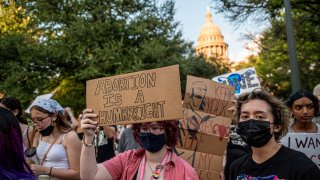
A federal judge is deciding whether to block the nation’s most restrictive abortion law, which has banned most abortions in Texas since early September and sent women racing hundreds of miles to get care outside the state.
The Biden administration on Friday urged U.S. District Judge Robert Pitman to suspend the law, saying Texas has waged an attack on a woman’s constitutional right to abortion. But even if the law is put on hold, abortion services in the second-most populous state may not instantly resume because doctors still fear that they could be sued without a more permanent legal decision.
That worry underscores the durability of Senate Bill 8, which has already withstood a wave of challenges. Pitman, based in Austin and who was appointed by former President Barack Obama, presided over a nearly three-hour hearing Friday but did not say when he will rule.
The law bans abortions once cardiac activity is detected, which is usually around six weeks, before some women know they are pregnant. To enforce the law, Texas deputized private citizens to file lawsuits against violators, and has entitled them to at least $10,000 in damages if successful.
We've got the news you need to know to start your day. Sign up for the First & 4Most morning newsletter — delivered to your inbox daily. >Sign up here.
“A state may not ban abortions at six weeks. Texas knew this, but it wanted a six-week ban anyway, so the state resorted to an unprecedented scheme of vigilante justice that was designed to scare abortion providers and others who might help women exercise their constitutional rights,” Justice Department attorney Brian Netter told the court.
So far, abortion providers trying to block the Texas law have been rejected at every turn. That makes the lawsuit filed by the Justice Department their best chance yet to deliver the first legal blow to the GOP-engineered restrictions, which were signed into law by Republican Gov. Greg Abbott in May and took effect Sept. 1.
Amy Hagstrom Miller, president of Whole Woman's Health, said some of the 17 physicians at her four clinics are ready to resume normal abortion services if the law is put on hold. Preparations began this week when some doctors gave patients found to have cardiac activity information to comply with another restriction — requiring a 24-hour waiting period before an abortion — so that they would be ready to be called back.
Politics
Political news from the U.S. Capitol, White House and around Washington, D.C., Maryland and Virginia
“It’s not the hundreds of people we’ve had to turn away,” Hagstrom Miller said in an interview. “But there is a significant group of people who have said, ‘Please, let me do whatever I can. Keep me on a list, and call me if you get an injunction.’”
But the majority of her physicians, Hagstrom Miller said, remain wary and fear lawsuits absent a permanent court ruling. Clinic staff are also worried. “Of course, we understand that,” she said.
Abortion providers saytheir fears have become realityin the short time the law has been in effect. Planned Parenthood says the number of patients from Texas at its Texas clinics decreased nearly 80% in the two weeks after the law took effect.
Some providers have described Texas clinics that are now in danger of closing while neighboring states struggle to keep up with a surge of patients who must drive hundreds of miles. Other women, they say, are being forced to carry pregnancies to term.
“This is not some kind of vigilante scheme,” said Will Thompson, defending the law for the Texas Attorney General's Office. “This is a scheme that uses the normal, lawful process of justice in Texas.”
If the Justice Department prevails, Texas officials would likely seek a swift reversal from the 5th U.S. Circuit Court of Appeals, which previously allowed the restrictions to take effect.
The Texas law is just one that has set up the biggest test of abortion rights in the U.S. in decades, and it is part of a broader push by Republicans nationwide to impose new restrictions on abortion.
On Monday, the U.S. Supreme Court begins a new term, which in December will include arguments in Mississippi’s bid to overturn 1973's landmark Roe v. Wade decision guaranteeing a woman’s right to an abortion.
Last month, the court did not rule on the constitutionality of the Texas law in allowing it to remain in place. But abortion providers took that 5-4 vote as an ominous sign about where the court might be heading on abortion after its conservative majority was fortified with three appointees of former President Donald Trump.
Ahead of the new Supreme Court term, Planned Parenthood on Friday released a report saying that if Roe v. Wade were overturned, 26 states are primed to ban abortion. This year alone, nearly 600 abortion restrictions have been introduced in statehouses nationwide, with more than 90 becoming law, according to Planned Parenthood.
Other states, mostly in the South, have passed similar laws that ban abortion within the early weeks of pregnancy, all of which judges have blocked. But Texas' version has so far outmaneuvered courts because it leaves enforcement to private citizens, not prosecutors, which critics say amounts to a bounty.
Texas officials argued in court filings this week that even if the law were put on hold temporarily, providers could still face the threat of litigation over violations that might occur in the time between a permanent ruling.
At least one Texas abortion provider has admitted to violating the law and been sued — but not by abortion opponents. Former attorneys in Illinois and Arkansas say they instead sued a San Antonio doctor in hopes of getting a judge who would invalidate the law.



